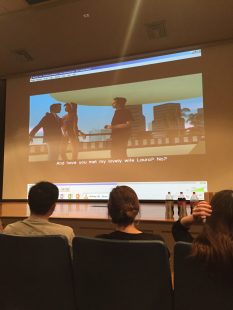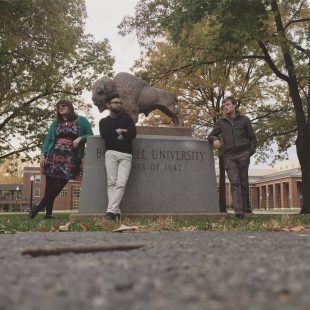 This semester, Sascha Goluboff, Professor of Cultural Anthropology, was awarded a DH initiative grant for her course titled “Writing Seminar for First Years: Terror and Violence.” I was invited by Professor Goluboff to view her students’ final DH projects in Stackhouse Theatre. The class was tasked with analyzing the popular video game “Grand Theft Auto” in terms of the racism and violence portrayed. Professor Goluboff asked students to pair up to create an iMovie that would analyze the depiction and their reactions to the violence in the game.
This semester, Sascha Goluboff, Professor of Cultural Anthropology, was awarded a DH initiative grant for her course titled “Writing Seminar for First Years: Terror and Violence.” I was invited by Professor Goluboff to view her students’ final DH projects in Stackhouse Theatre. The class was tasked with analyzing the popular video game “Grand Theft Auto” in terms of the racism and violence portrayed. Professor Goluboff asked students to pair up to create an iMovie that would analyze the depiction and their reactions to the violence in the game.
After completing a four page paper, the students were told to read their papers as narration in their iMovie project. While many of the students grumbled about disliking the sound of their own recorded voices, the students generally preferred creating a movie over writing a paper. “I liked iMovie more than the traditional paper. Images and scenes from iMovie can convey concepts and ideas in ways that are hard to describe on paper,” said first-year student Mikki Whittington. Most pairs came to the conclusion that the game promoted various sexist and racist stereotypes. For example, the students found that drug dealers were typically Hispanic, while more violent criminals were portrayed as black. The central, hyper-masculine male character was typically surrounded by highly sexualized women dressed in minimal clothing. One group argued that behaviors in this game could even lead gamers to believe this game is a mirror of reality.
The students incorporated images and clips from the video game into their iMovie project, which reinforced their arguments about the offensive stereotypes and harsh violence. “Their arguments about violence against women and minorities within the game were much more persuasive when paired up with actual footage. So, in a sense, the topic lent itself to a digital argument,” Professor Goluboff said.
Students said that they spent many hours on the project, but I felt that many of them really enjoyed the process of creating an iMovie project. The students were able to creatively manifest their ideas in the digital sphere and the video clips also strongly supported their argument. Since students often don’t get the chance to experience each other’s work, it was fun to see the students engaging with and enjoying one another’s final products (with some help from popcorn and soda provided by Professor Goluboff!)
-Hayley Soutter, DH Undergraduate Fellow
This program is made possible by a grant from the Andrew W. Mellon Foundation.
